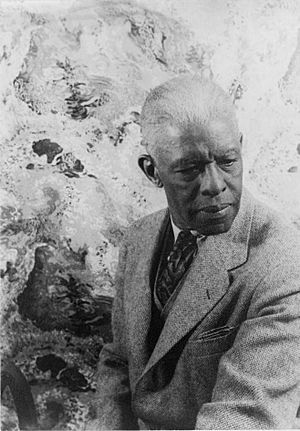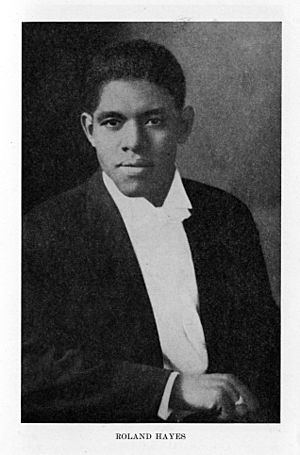Roland Hayes facts for kids
Quick facts for kids
Roland Hayes
|
|
|---|---|

Hayes in 1954, photo by Carl Van Vechten
|
|
| Born |
Roland Wiltse Hayes
June 3, 1887 Curryville, Georgia, U.S.
|
| Died | January 1, 1977 (aged 89) Boston, Massachusetts, U.S.
|
| Occupation | Musician, singer |
| Spouse(s) | Helen Alzada Mann (1893-1988) (1932) |
| Awards | Spingarn Medal (1924) |
Roland Wiltse Hayes (born June 3, 1887, died January 1, 1977) was an American singer and composer. He was known for his beautiful voice and his ability to sing in different languages like French, German, and Italian.
Before Hayes, other famous African-American singers like Sissieretta Jones and Marie Selika were not recorded. Roland Hayes, along with Marian Anderson and Paul Robeson, helped change this. He was one of the first Black classical singers to have his music recorded, starting in 1939 with Columbia.
Contents
Early Life and Family
Roland Hayes was born in Curryville, Georgia, on June 3, 1887. His parents, William and Fannie Hayes, were farmers. His mother had once been a slave on the same land. Roland's father was his first music teacher. He taught Roland to listen to the musical sounds in nature.
When Roland was 11, his father passed away. His mother then moved the family to Chattanooga, Tennessee. Roland's father had some Cherokee family history. His mother's great-grandfather, Aba Ougi, was a chief from the Ivory Coast. He was brought to the United States in 1790.
Roland first heard Negro spirituals at Mt. Zion Baptist Church in Curryville. His mother had founded this church. It was Roland's job to learn new spirituals from older people and teach them to the church choir. He once shared how he started his singing career:
"I found a new way to make iron weights," he said. "This gave me more pay and free time. I had never heard real music before. But one day, a pianist came to our church in Chattanooga. I was in the choir and was asked to sing a solo with him. The pianist liked my voice. He showed me records by Caruso. This opened up a new world for me. The beauty of what a voice could do amazed me."
Hayes studied music with Arthur Calhoun, an organist, in Chattanooga. In 1905, Roland started studying at Fisk University in Nashville. He had only finished sixth grade. His mother worried he was wasting money. She thought Black people could not earn a living from singing. As a student, he began performing publicly. He toured with the Fisk Jubilee Singers in 1911. He later studied in Boston with Arthur Hubbard. Hubbard would only teach him at his home. He did not want Roland to appear at his studio with his white students. To support himself, Roland worked as a messenger for an insurance company.
Beginning His Career
In January 1915, Hayes performed for the first time in Manhattan, New York City. These concerts were led by orchestra leader Walter F. Craig. From 1916 to 1919, Hayes gave his own concerts. He toured across the country. For his first concert, he had no sponsor. So, he used $200 of his own money to rent Jordan Hall. To earn more money, he toured Black churches and colleges in the South.
In 1917, he announced his second concert. It would be at Boston's Symphony Hall. On November 15, 1917, all tickets were sold. Hayes's concert was a great success. But the music world still did not see him as a top classical performer. He sang at other concerts, including at Carnegie Hall. He also performed with the Philadelphia Orchestra and at music festivals. In 1917, he formed the Hayes Trio. He sang with baritone William Richardson and pianist William Lawrence.
In April 1920, Hayes traveled to Europe. He took lessons with Sir George Henschel. Henschel was the first conductor of the Boston Symphony Orchestra. Hayes gave his first concert in London in May 1920. Lawrence Brown played the piano for him. Soon, Hayes was singing in major cities across Europe. He became very famous. About a year after arriving in Europe, Hayes had a concert at London's Wigmore Hall. The next day, he was asked to perform for King George V and Queen Mary at Buckingham Palace.
He returned to the United States in 1923. His official debut was on November 16, 1923, in Boston's Symphony Hall. He sang music by Berlioz and Mozart, and also spirituals. Pierre Monteux conducted the orchestra. Critics praised his performance. He was the first African-American soloist to sing with the Boston Symphony Orchestra. He received the Spingarn Medal in 1924.
Later Career
Hayes eventually got professional management. He was reportedly earning a lot of money each year. In Boston, he also taught voice lessons. One of his students was Canadian singer Frances James. In 1948, he published a collection of spirituals called My Songs: Aframerican Religious Folk Songs Arranged and Interpreted.
After the 1930s, Hayes stopped touring in Europe. The political changes and the rise of the Nazi Party made it unsafe for African Americans.
In 1932, while in Los Angeles for a Hollywood Bowl performance, he married Helen Alzada Mann. She was born in Chattanooga. A year later, they had a daughter named Afrika Hayes. The family moved to a home in Brookline, Massachusetts.
Hayes did not perform as much from the 1940s to the 1970s. But he continued to give yearly concerts at Carnegie Hall. He also performed at Fisk University and other colleges. In 1966, he received an Honorary Doctorate of Music from The Hartt School of Music. Hayes kept performing until he was 85 years old. His last concert was at the Longy School of Music in Cambridge. He was able to buy the land in Georgia where he grew up.
Roland Hayes passed away on January 1, 1977. This was five years after his final concert.
Facing Challenges
In 1924, before going to Berlin, Germany, Hayes was warned not to go. Germans were upset about being occupied by armies with Black troops. A newspaper in Berlin published an open letter. It called for stopping "the concert of an American Negro who has come to Berlin to defile the name of the German poets and composers." Hayes refused to believe he would be blamed for the actions of others. He booked his concert at Konzerthaus Berlin.
When he appeared on stage, some people in the audience booed him. But Hayes began to sing "Du bist die Ruh" by Franz Schubert. His amazing voice and talent won over the audience. His concert was a success.
In 1942, Hayes's wife and daughter sat in seats meant for white customers in a shoe store in Rome, Georgia. An argument started, and they left. Later, Hayes talked to the store owner, whom he knew, and solved the problem. But when he left, police attacked him and arrested him. His wife was also taken into custody. This story became known across the country. Many people felt sympathy for Hayes. The police officer who attacked him was fired. Federal charges were brought against the officer. A poem by Langston Hughes, called "How About It, Dixie," talks about this event.
Hayes also faced criticism for performing in a theater that allowed both Black and white people in Washington, D.C. in 1926. Then, he performed in a theater that separated people by race in Baltimore, Maryland.
In 1945, Hayes taught at Black Mountain College. His public concert there was a very important moment for the college. After this concert, where seating was not separated by race, the school had its first full-time Black student and teacher.
His Legacy
- In 1982, the University of Tennessee at Chattanooga opened the Roland W. Hayes Concert Hall. It is part of the Dorothy Patten Fine Arts center.
- The Roland Hayes Committee was formed in 1990. They wanted Roland Hayes to be added to the Georgia Music Hall of Fame. In 1992, this committee became the Roland Hayes Music Guild and Museum in Calhoun, Georgia. His daughter Afrika attended the opening.
- There is a historical marker at Calhoun High School in Calhoun, Georgia. It is near the front of the Calhoun Civic Auditorium.
- A musical play about Hayes's life, called Breath & Imagination by Daniel Beaty, premiered in 2013.
- Part of Georgia State Route 156 was named after Hayes.
- A bronze plaque marks Hayes's home at 58 Allerton Street in Brookline, Massachusetts. It was dedicated on June 12, 2016. His daughter Afrika and former Massachusetts Governor Michael Dukakis attended the ceremony.
- A school in Roxbury, Massachusetts is named after him. The Roland Hayes School of Music teaches music to high school students.
Discography
LPs
- Roland Hayes (vocal), Reginald Bordman (piano) – The Life of Christ (Amadeo, 1954)
- Roland Hayes (vocal), Reginald Boardman (piano) – Negro Spirituals (Amadeo, 1955)
- Roland Hayes (vocal), Reginald Boardman (piano) - "Roland Hayes Sings" (Amadeo AVRS 6033)(Vanguard)
- Roland Hayes (vocal), Reginald Boardman (piano) - "Roland Hayes - Christmas Carols of the Nations" (Vanguard VRS7016, 195?)(10")
- Roland Hayes (vocal), Reginald Boardman (piano) - "The Life of Christ" (Vanguard VRS462, 1954)
- Roland Hayes (vocal), Reginald Boardman (piano) - "My Songs" (Vanguard VRS494, 1956)
- Roland Hayes (vocal), Reginald Boardman (piano) - "The Art of Roland Hayes: Six Centuries of Song" (Vanguard VRS448/9, 1966)(2 LP)
- Roland Hayes (vocal), Reginald Boardman (piano) - "The Life of Christ" (Vanguard Everyman SRV352SD, 1976)
- Roland Hayes (vocal), Reginald Boardman (piano) - "Afro-American Folksongs" (Pelican LP2028, 1983)
CDs
- Roland Hayes (vocal), Reginald Boardman (piano) - "The Art of Roland Hayes" (Smithsonian Collection of Recordings RD041, 1990)
- The Art of Roland Hayes: Six Centuries of Song (Preiser, 2010)
Images for kids
See also
 In Spanish: Roland Hayes para niños
In Spanish: Roland Hayes para niños
 | Emma Amos |
 | Edward Mitchell Bannister |
 | Larry D. Alexander |
 | Ernie Barnes |



